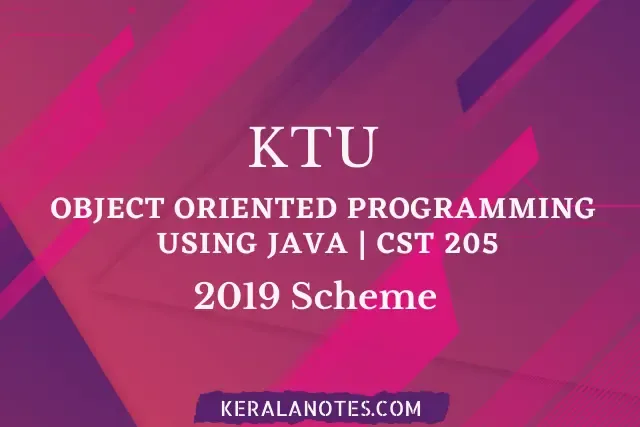This is a set of notes for CST 205 OBJECT-ORIENTED PROGRAMMING. The notes are designed to take a Second-year student through the topics in their third semester. Object-oriented programming (OOP) is a powerful programming paradigm that uses Abstraction, Encapsulation, and Inheritance to create safer, easier to maintain programs. In this KTU S3 notes, we'll explore how to use OOP principles to write more robust and readable code using the Java programming language. Stay connected with Keralanotes.com
| Board | KTU |
| Scheme | 2019 New Scheme |
| Year | Second Year |
| Semester | S3 Computer Science |
| Subject | CST 205 | OBJECT ORIENTED PROGRAMMING USING JAVA Notes |
| Credit | 4 Credit |
| Category | KTU S3 Computer Science |
KTU S3 CSE OBJECT ORIENTED PROGRAMMING USING JAVA Notes (2019 Scheme)
Module 1
Module 1 - Syllabus
Introduction: Approaches to Software Design - Functional Oriented Design, Object Oriented Design, Case Study of Automated Fire Alarm System. Object Modeling Using
Unified Modeling Language (UML) – Basic Object Oriented concepts, UML diagrams, Use case model, Class diagram, Interaction diagram, Activity diagram, Statechart diagram.
Introduction to Java - Java programming Environment and Runtime Environment, Development Platforms -Standard, Enterprise. Java Virtual Machine (JVM), Java compiler, Bytecode, Java applet, Java Buzzwords, Java program structure, Comments, Garbage Collection, Lexical Issues.
Module 1 - Notes
Module 1 Object-Oriented Programming using Java | CST 205 PDF Notes
Module 2
Module 2 - Syllabus
Core Java Fundamentals: Primitive Data types - Integers, Floating-Point Types, Characters, Boolean. Literals, Type Conversion and Casting, Variables, Arrays, Strings, Vector class.
Operators - Arithmetic Operators, Bitwise Operators, Relational Operators, Boolean Logical Operators, Assignment Operator, Conditional (Ternary) Operator, Operator Precedence. Control Statements - Selection Statements, Iteration Statements and Jump Statements.
Object-Oriented Programming in Java - Class Fundamentals, Declaring Objects, Object Reference, Introduction to Methods, Constructors, this Keyword, Method Overloading, Using Objects as Parameters, Returning Objects, Recursion, Access Control, Static Members, Final Variables, Inner Classes, Command Line Arguments, Variable Length Arguments.
Inheritance - Super Class, Sub Class, The Keyword super, protected Members, Calling Order of Constructors, Method Overriding, the Object class, Abstract Classes and Methods, using final with Inheritance.
Module 2 - Notes
Module 2 Object-Oriented Programming using Java | CST 205 PDF Notes
Module 3
Module 3 - Syllabus
More features of Java: Packages and Interfaces - Defining Package, CLASSPATH, Access Protection, Importing Packages, Interfaces.
Exception Handling - Checked Exceptions, Unchecked Exceptions, try Block and catch Clause, Multiple catch Clauses, Nested try Statements, throw, throws and finally. Input/Output - I/O Basics, Reading Console Input, Writing Console Output, PrintWriter Class, Object Streams and Serialization, Working with Files.
Module 3 - Notes
Module 3 Object-Oriented Programming using Java | CST 205 PDF Notes
Module 4
Module 4 - Syllabus
Advanced features of Java: Java Library - String Handling – String Constructors, String Length, Special String Operations - Character Extraction, String Comparison, Searching Strings, Modifying Strings, using valueOf(), Comparison of StringBuffer and String.
Collections framework - Collections overview, Collections Interfaces- Collection Interface, List Interface. Collections Class – ArrayList class. Accessing a Collection via an Iterator. Event handling - Event Handling Mechanisms, Delegation Event Model, Event Classes, Sources of Events, Event Listener Interfaces, Using the Delegation Model.
Multithreaded Programming - The Java Thread Model, The Main Thread, Creating Thread, Creating Multiple Threads, Synchronization, Suspending, Resuming and Stopping Threads.
Module 4 - Notes
Module 4 Object-Oriented Programming using Java | CST 205 PDF Notes
Module 5
Module 5 - Syllabus
Graphical User Interface and Database support of Java: Swings fundamentals - Swing Key Features, Model View Controller (MVC), Swing Controls, Components and Containers, Swing Packages, Event Handling in Swings, Swing Layout Managers, Exploring Swings –JFrame, JLabel, The Swing Buttons, JTextField. Java DataBase Connectivity (JDBC) - JDBC overview, Creating and Executing Queries – create a table, delete, insert, select.
Module 5 - Notes
KTU S3 CSE Related Links
| KTU S3 CSE Syllabus | Click Here |
| KTU S3 CSE Study Notes | Click Here |
| KTU S3 CSE Reference Textbook | Click Here |
| KTU S3 CSE Previous Year Solved Questions | Click Here |
| KTU S3 CSE Study Materials | Click Here |
Other Related Links
| MAT 203 - Discrete Mathematical Structures | Click Here |
| CST 201 - Data Structures | Click Here |
| CST 203 - Logic System Design | Click Here |
| CST 205 - Object-Oriented Programming Using Java | Click Here |
| MNC 202 - Sustainable Engineering | Click Here |
| HUT 200 - Professional Ethics | Click Here |
| EST 200 - Design and Engineering | Click Here |
| CSL 201 - Data structure LAB | Click Here |
| CST 203 - Object-Oriented Programming Lab (In Java) | Click Here |







